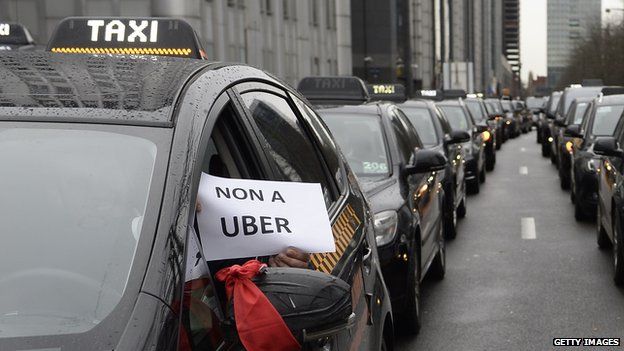Uber banned in Germany as police swoop in other countries
- Published

Uber's "low-cost" UberPop service has been banned in Germany after a court decided it violated transport laws.
Fines of 250,000 euro (£181,000) were imposed for each violation.
It followed the news that the company's Paris offices were raided by police investigating the same service.
And in South Korea nearly 30 people linked to the company were charged with running an illegal taxi firm. They included Uber's chief executive Travis Kalanick, police told the BBC.
On Thursday 19 March, an Uber spokesman denied reports, which had surfaced the previous day, that Mr Kalanick was among those charged.
But a South Korean police official told the BBC on Friday that he had been charged.
Ongoing discussion
Uber said it regretted the Frankfurt District Court's decision, saying it represented a "fundamental infringement of our ability under European law to establish and provide a service".
While UberPop, which unites passengers with drivers who do not have professional licences, is banned, the company insisted it would continue to run its services using licensed limousine and taxi drivers in Germany.
A spokesman said it would also appeal against the court's decision and, in the meantime, would introduce an "alternative ridesharing service that we are developing specifically to fit the court's interpretation of existing regulations in Germany".
The spokesman added that Uber would continue discussions with German regulators in the hope of finding a compromise.
The case, brought by German taxi operator group Taxi Deutschland, is one of more than a dozen lawsuits which have been filed in countries across Europe in recent months against the San Francisco-based company.
Unlicensed drivers
Dieter Schlenker, chairman of the Taxi Deutschland co-operative, hailed the decision as a move that would protect professional taxi drivers from competition by unlicensed Uber drivers.
The presiding judge Joachim Nickel said Uber violated German laws on commercial passenger transportation because its drivers did not have the right kinds of licences.
And he said Uber's business model violated both national and European Union laws because it did not fully insure drivers or passengers in the event of accidents.
Lawyers representing Uber denied it was subject to rules governing taxi operators, claiming the company merely acts as an exchange connecting drivers with clients.
In response, Uwe Eilers, one judge on the three-judge panel that delivered its decision on Wednesday, said: "In that case, you should include in your business description that Uber offers rides for free."
The judges' decision came after it emerged that Uber's Paris offices had been raided by police investigating its UberPop service on Monday. Staff and other people linked to the firm in South Korea were charged with running an illegal taxi firm as part of a separate investigation.
Uber said its South Korean staff had not broken any laws and called the Paris raid "disproportionate".
South Korean police told the BBC that they had already summoned Mr Kalanick and planned to file for an arrest warrant.
In France, 30 police officers descended on the company's Paris headquarters looking for information, the company told the BBC.
A spokesman said the officers stayed all day and took away mobile phones that were intended for the use of Uber drivers.
'Intimidation'
He called the raid "intimidation", saying: "Why would they send 30 police officers? We are 46 [people] here. The only things we have are computers and telephones."
Uber said the police investigation was based on French legislation it has already complained to the European Commission about, and was confident would be scrapped.
According to Agence France-Presse AFP, dozens of non-professional UberPop users have been fined since the start of the year.
UberPop has been ruled illegal in France, but the company has appealed against a 100,000 euro (£72,000) fine it received last year, it said.
According to a report from the South Korean news agency Yonhap, 29 people connected to Uber had been charged.
The agency reported Mr Kalanick, who has already been indicted on charges of establishing and running Uber Korea, had been charged again on suspicion of conducting an illegal business, citing local police sources.
But, on Thursday, Uber said that - barring December's indictment - he had not been charged by South Korean authorities.
Among those also charged were the heads of six different car rental firms, who were suspected of connecting passengers with nearby drivers through the UberTaxi app without a licence, police told Yonhap.
According to the reports, police said the Uber app posed a risk for passenger safety because drivers were not screened, cars were uninsured and mobile phone numbers and credit card numbers could be leaked.
Police also said Uber Korea took 20% of passengers' taxi fares as commission and paid the remainder to drivers.
By providing such services, one car rental firm made 96 million won (£58,000) in three months, officers claimed.
Asked about the reports, an Uber spokesman said: "Uber has fully co-operated with the police during the course of their investigation and we will continue to do so as the matter is referred to the prosecution for review.
"Uber does not believe the employees in Korea have engaged in any misconduct or illegal behaviour. We believe the prosecutors will come to a similar conclusion."
- Published10 December 2014
- Published1 December 2014
- Published24 December 2014